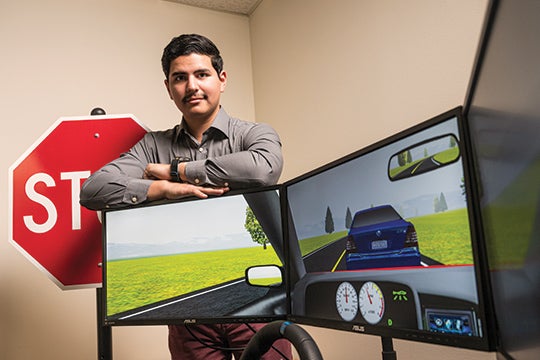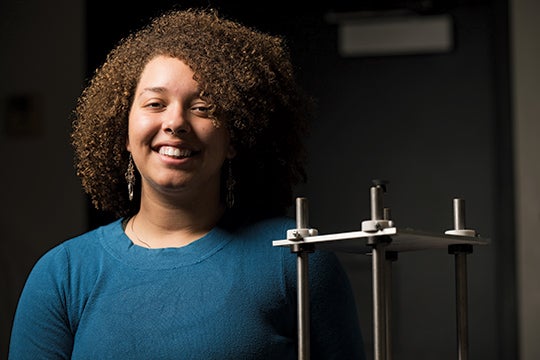A Spirit of Inquiry
Research is accessible to all Rice students who have a passion for digging deeper into specific topics.
Spring 2024
By Jenny West Rozelle ’00
When it comes to research at a university, many people visualize engineers and biochemists with beakers and microscopes. But at Rice, undergraduates from all majors are given ample opportunities to conduct multidisciplinary research on campus, around the globe or across the street at the world’s largest medical center.
Various fellowships, funds and scholarships — such as Summer Undergraduate Research Fellowships, which offer $5,000 to under-resourced students working on research during the summer — help level the field for students who require financial assistance to participate in research or design work. And Rice’s Office of Undergraduate Research and Inquiry sponsors workshops like Research 101 and Research Ethics in addition to communication workshops with tips on how to present research.
Here are a few accounts from current undergraduates who are honing in on their research niche.

AMERICA SALAS
What limits women and minorities in the workplace?
Through her summer undergraduate research fellowship, America Salas ’25 was able to not only study a topic that was important to her but also learn to “navigate professional settings without lessening my cultural identity,” she says. “My research topic served as a way for me to venture into the professional world with those I could identify with.”
Salas, a psychology major, was matched with a mentor in the business and entrepreneurship field. “I explored inherent workplace limitations that tend to be placed on women and minorities,” she says. Through interviews and literature reviews, Salas created a summary of common experiences in a magazine format. “My goals in this research were to further my design and creation skills but, more importantly, create an outlet for these individual stories.”
Now a junior, Salas feels that research opportunities at Rice are invaluable. “The research experience allows undergraduates to sharpen their skills for future endeavors and also allows them to interact with field experts.”

LEGRAND DUDLEY
What makes automated driving different?
As a psychology major, LeGrand Dudley ’24 has been conducting research that affects more and more drivers on the road today — automated vehicles, or AVs.
“I am involved in automated driving research surrounding behavioral adaptation — how drivers of automated vehicles adapt to the automation’s driving performance,” he says. As AVs are integrated onto our roadways, key dynamics will change — people will supervise the AVs rather than making independent driving choices — potentially degrading driving performance.
Dudley’s work also feeds his intellectual curiosity. “Through my prior undergraduate research about driver hazard detection, it felt like the next step to create my own experiment within the honors thesis program about AVs,” he says. “Human factors research led me to develop my own discipline, satisfy my own curiosity, and contribute to the scientific literature about fascinating new projects.” This research has cemented Dudley’s plans to pursue a graduate degree in psychology.

AUTUMN HILDEBRAND
What can fruit fly behavior tell us?
Undergraduate research is what prompted neuroscience major Autumn Hildebrand ’24 to transfer to Rice.
“I was at Lone Star College my freshman year and saw an ad from Rice graduate student Marina Hutchins, who works in the lab of Julia Saltz, associate professor of biosciences,” she says. “I got the position with her and eventually transferred. I focus on Drosophila melanogaster, the common fruit fly — I expose young male flies to certain early life experiences, such as isolation, and once they become adults, I determine whether that isolation impacts their propensity toward aggressive behaviors.”
Prior to working with Hutchins, Hildebrand had not seen Rice in her future. Now, the senior pre-med looks for ways to give similar opportunities to others. “I work with the Take Flight STEM Pathway program, which involves community college students from Lone Star and San Jacinto College doing research at Rice. I find it very rewarding to give back in that way because researching at Rice as a community college student changed my life.”

CALLUM FLEMISTER
What’s the best way to optimize heat transfer?
Last year, the summer research fellowship program enabled Callum Flemister ’26 to further their interest in engineering. “I want to go into environmental engineering with a mechanical engineering background and focus on power production and conservation,” Flemister says. “One application is heat optimization.” After learning about Rice’s Nanoscale Heat Transfer Lab — led by mechanical engineer Geoff Wehmeyer — Flemister reached out to begin a conversation about joining the lab. Wehmeyer suggested the summer fellowship program.
“Professor Wehmeyer’s lab works to develop heat transfer devices that use magnets to create moving connection pieces capable of transferring thermal energy from a heat source to a heat drain,” says Flemister. “I built an apparatus to confirm simulation data on the devices’ effectiveness.”
Flemister, who plans to continue research at Rice and pursue a master’s degree, says the fellowship program “allowed me to be on campus and pay for my necessities so I could focus on the research I was here to do.”
